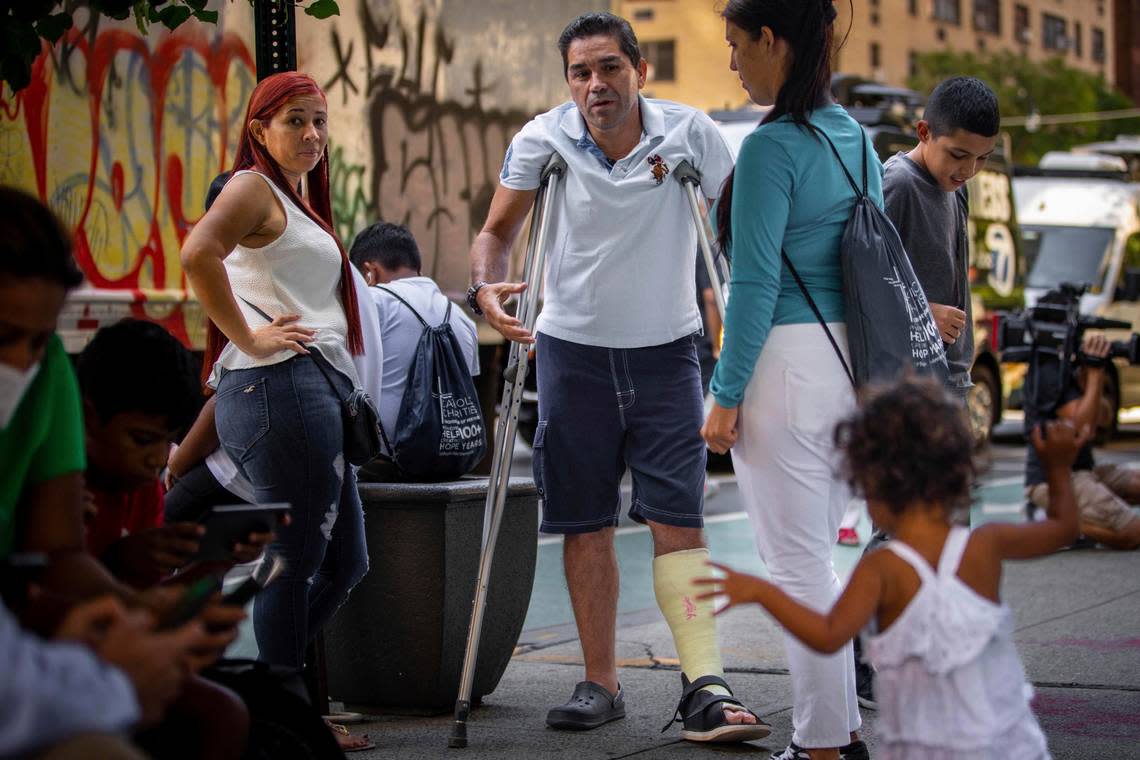U.S. and Venezuela made a deal to restart direct deportations, but terms aren’t clear

- Oops!Something went wrong.Please try again later.
- Oops!Something went wrong.Please try again later.
- Oops!Something went wrong.Please try again later.
Biden administration officials said Friday they are “glad” that Venezuela has agreed to accept deportation flights from the United States following an agreement with leader Nicolás Maduro, even though the U.S. doesn’t formally recognize his authority and has no diplomatic relations with his government.
“As we have done with countries from all over the world, for a long time we have urged Venezuela to accept its citizens. And we are glad that they agreed,” said Deputy Assistant Secretary of State Mark Wells
He added that “both of our governments have discussed an arrangement to ensure the safe, orderly and humane repatriation of Venezuelan migrants who do not qualify for protection under our laws.”
The United States stopped formally recognizing Maduro as the legitimate president of Venezuela in January 2019. Instead, the U.S, recognized instead the democratically elected Venezuelan National Assembly as the only legitimate branch of the country’s government. It’s unclear which channels both sides used to reach the agreement because the United States has not changed its stance on Maduro’s legitimacy.
READ MORE: U.S. strikes deal with Maduro government, will start deportation flights to Venezuela
Wells made the comments during a conference call Friday with reporters, a day after the federal government announced that it would kickstart the deportation flights. Officials did not answer questions about how the deal came to be, nor if the United States offered concessions to the Maduro government in exchange for accepting back the deported Venezuelans.
“The action announced yesterday is part of a regional effort to address the historic irregular migration challenge – and limited to that issue only,” a State Department spokesperson said.
“Our Venezuela sanctions are still in place, and we will continue to enforce them,” the spokesperson added. “We continue to strongly support the peaceful restoration of democracy, the return of free and fair elections, and respect for the rights and freedoms of Venezuelans.”
The administration officials in the Friday call did not respond to criticisms from South Florida’s immigration-advocacy groups and Venezuelan exiles that the measure would solidify Maduro’s hold on power and put migrants in danger — as Alejandro Mayorkas, the secretary of Homeland Security, himself said to explain the agency’s recent decision to grant deportation protections to nearly half a million Venezuelans.
“This decision is a blatant betrayal of the very principles that the United States claims to uphold – justice, compassion, and human rights,” the Florida Immigrant Coalition said in a statement Friday.
More than seven million Venezuelans have fled their homeland in recent years. Human-rights groups have documented government-perpetrated extrajudicial killings, arbitrary arrests and detentions, crackdowns on journalists, and persecution of the political opposition.
The U.S. government said in a report last year that “the Maduro regime took no effective action to meaningfully identify, investigate, prosecute, or punish officials who may have committed human-rights abuses or engaged in corruption.” The majority of Venezuelans live with food shortages, insufficient medical care and crumbling infrastructure.
“Venezuelans have fled a country that is more violent than Mexico, poorer than Haiti, with famine levels comparable to Yemen, and an economy the size of Tanzania,” said former opposition mayor David Smolansky, who was forced to exile in the United States by the Maduro government in 2017. “They are fleeing a regime that commits crimes against humanity.”
The U.S. officials could not say what has changed regarding Mayorkas’ earlier assessment of the situation in Venezuela, but added that returning migrants to countries in turmoil was not a policy exception.
The direct deportation flights to Venezuela are the latest attempt by the Biden administration to curb irregular immigration at the border. The federal government also rolled out a parole process that allows people from Haiti, Cuba, Venezuela, and Nicaragua to live and work in the United States for two years as long as they have a financial sponsor and pass background and health checks. More than 130,000 Venezuelans have arrived through the parole program and a federal government phone app, said Blas Nuñez-Nieto, assistant secretary for border and immigration policy at the Department of Homeland Security.
“I need to be frank. We obviously do these direct repatriations now to Venezuela, but also to other countries that have complicated situations such as Haiti, Cuba and other countries around the world,” Nuñez-Nieto said. “It is a principle of international law that governments should accept direct repatriations of their nationals who do not establish a legal basis for remaining in the United States.”
Court documents from a legal challenge from Texas, Florida and other Republican-led states highlight the federal authorities’ reliance on other governments when crafting immigration policies and deporting people back to their home countries.
Homeland Security said that the Biden parole programs depended on “Mexico’s willingness to accept the return of nationals” from those four countries that don’t use the available avenues for legal migration.
“If DHS cannot provide lawful processes for some [Cubans, Nicaraguans, Haitians, and Venezuelans] to come directly to the United States, Mexico will almost certainly stop accepting these deportations,” the agency said.
Even when the Biden administration has agreements with countries like Cuba and Haiti to deport its nationals, DHS acknowledged that repatriating them is challenging. Government officials did not say how often the deportation flights to Venezuela would take place.

